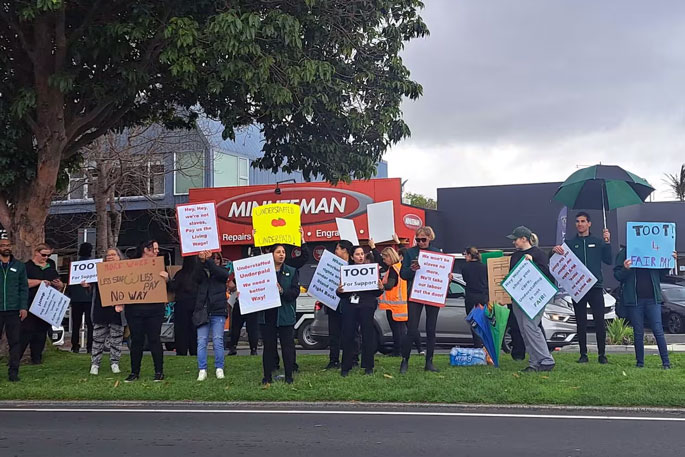Hundreds of Woolworths staff in Tauranga and the Bay of Plenty walked off the job at midday on Tuesday demanding better pay and conditions.
The nationwide two-hour industrial action by FIRST Union members took place after Woolworths ruled out paying the living wage of $27.80 an hour and addressed staff concerns about understaffing levels, security and pay incentives to help fill night and weekend shifts. Staff from more than 190 supermarkets nationwide held protest rallies.
A Woolworths NZ spokesperson said the company made a strong offer, which included pay increases of between 6.8% and 10.1% over two years further to the agreed 19% increase in 2022, improved sick leave benefits, increased caregiver and bereavement leave and improved discounts for staff.
Among the striking staff were about 30 from the Cameron Rd Tauranga, Bureta Park and Fraser Cove stores and a least a dozen from the Bayfair mall store who waved placards: “When workers’ rights are under attack - Stand up, Fight Back” and “Hey, hey we’re not slaves, pay us the living wage”.
The protest attracted loud toots from passing vehicles.
One protestor said she and her colleagues “felt buoyed” by the community support. She said she hoped Woolworths was listening and would come back with a fairer offer.
A long-standing Tauranga Woolworths worker, who asked not to be named, said: “Having a pay raise is nice, but this was not the main priority. The most important thing for many of us is addressing the understaffing levels and our safety”.
Another staff member said staff were asked to do more to meet shortfalls in staffing levels despite some workers being paid “well below” the living wage.
First Union Bay of Plenty organiser Hayley Derry, who represents Woolworth members from Katikati to Whakatāne, said the striking workers did not take walking off their jobs lightly. She said some staff did not earn enough to buy groceries at the stores where they worked.
“But this is crunch time for our members, who are feeling undervalued, unpaid and very stressed, especially about staffing levels. And a lot of staff are also feeling very vulnerable in terms of their safety and security.”
Derry said safer staffing levels and better security measures would help reduce incidents of abuse and theft in the stores.
Rudd Hughes, First Union national secretary for retail and finance, said Woolworths’ wage offer was significantly below workers’ expectations and it was behind what other retailers paid.
“We’ve negotiated for more than 13 days to get a fair deal, but we are still miles apart from the company on the most basic issues of pay, safety and staffing”.
“Woolworths have offered minimal wage increases below the rising household cost of living, sought reductions to workers’ existing employment conditions, and proposed pay rates that are falling behind their competitors.”
Hughes said Woolworths should not expect to make “insane, record-breaking profits” every year, especially while rebranding and retrofitting more than 70 of its 185 stores during their $400m name change, and not pay staff a living wage and ensure better working conditions.
“A lack of money is not the issue here ‒ it’s a lack of will and a lack of ambition.”
A Woolworths NZ spokesperson said making sure people were paid fairly had always been a priority for the company.
“We are one of the leaders in pay for our sector.
“Additionally, we’re under way with a $45 million investment in making our stores safer including team safety cameras in all stores, trolley locks, fog cannons and double-entry gates, We’re also looking at bringing in duress alarms for those working in isolated areas.
“We have to balance increasing costs in our business so we can provide more value for our customers. We will continue to engage with First Union in good faith.”



1 comment
Look after your staff
Posted on 11-09-2024 13:40 | By The Sage
The supermarkets are making record profits so can well afford to give their staff a decent pay rate. They also need to look after their staff better. They need to set up procedures to make staff feel valued and supported. When this is done the number of sick days will drop and staff are more likely to stay because they feel valued.
Leave a Comment
You must be logged in to make a comment.